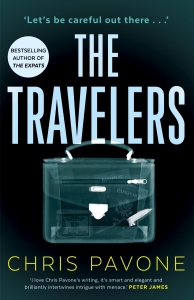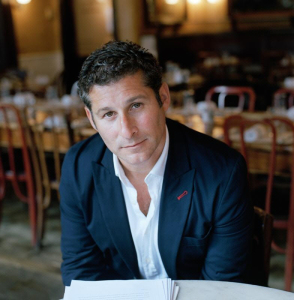The Travelers – Chris Pavone
 ‘The Travelers’ is Chris Pavone’s third thriller, after his highly successful previous novels, ‘The Accident’ and ‘The Expats’. The latter, his first, received both the Edgar and Anthony awards for Best First Novel. Pavone’s latest is a well-crafted hall of mirrors, filled with smokescreens, evasion and deceit, hurling the reader headlong in a world populated by men and women who are consistently lying to one another. Because it’s their job to do so.
‘The Travelers’ is Chris Pavone’s third thriller, after his highly successful previous novels, ‘The Accident’ and ‘The Expats’. The latter, his first, received both the Edgar and Anthony awards for Best First Novel. Pavone’s latest is a well-crafted hall of mirrors, filled with smokescreens, evasion and deceit, hurling the reader headlong in a world populated by men and women who are consistently lying to one another. Because it’s their job to do so.
The main protagonists, Will Rhodes and his wife Chloe, are actually a fairly ordinary upper-middle class New York couple in their mid-thirties: the yuppies of old but with less money, more debt, and more uncertain careers. Will is a journalist at Travelers, a long-standing print travel magazine which is struggling to compete in the world of Mach-speed web publishing. Chloe used to work for Travelers too, but to lower the odds of both ending up redundant she quit the magazine and embarked on a tenuous freelance career.
Then Will, on one of his overseas assignments in glamorous locations, does something silly: he falls for a beautiful woman, Elle, and lands in deep trouble. Elle and a muscular associate of her, exploiting Will’s roving journalist role, coerce him into working covertly for an unspecified US government agency. Threatened with the ruination of his marriage and career, Will is forced into becoming an asset, for an outfit that may well be the CIA. Will’s world shatters as he has to start lying to his wife, his friends, his colleagues and his employer. It’s when we discover that the latter, in the person of charismatic Travelers editor Malcolm Somers, is also hiding a dark secret, that we abruptly realise the whole world Pavone had built for us up to then is an illusion, a secret within a secret. Just as Will is, we are clueless. Who is spying on what, and for whom?
Starting from this intriguing, well-crafted premise, ‘The Travelers’ has all the ingredients, and Chris Pavone the narrative skills and the needle-sharp insights into human nature, to leaven into a classic tale of present-day espionage. Pavone does take his time about it, and I confess that I wondered mid-way through the novel if there wasn’t an element missing: the spice added by the knowledge that something essential is in the balance, that the outcome of the (spying) game has a moral significance. Right vs Wrong, Good vs Evil, Us vs Them. Something that touches the lives of the characters in a deeper spot than their wallet, their career or the dynamics of their marriage. Something with an emotional value like, dare I say it, an ideal.
This is an old-fashioned perspective, I know. And the observation shouldn’t detract from the crucial insight that Pavone offers us on the intelligence-gathering world: that the days of clear-cut good vs evil, if they ever existed outside of John Le Carré, are long gone. The Cold War is dead and buried, despite Mr Lavrov’s recent doomsday predictions. Old foes can be new friends, and viceversa, and intelligence gathering doesn’t follow national borders any more.
Also, that spying is not, mostly, 007 stuff: it’s drudgery and tedium, boredom over adrenaline, petty misdemeanours rather than save-the-world epics. And the web of blanket surveillance and counter-surveillance ostensibly uncovered by Edward Snowden does touch the lives of Westerners in a different but no less insidious way than the threat of the so-called Islamic State.
If there is a moral element that Pavone makes no bones about, it is that the compulsion to know, at all costs, even for the holy grail of national security (and sometimes not just for that, as story will show…) is a self-sustaining monster, that can blow out of all proportion and damage anyone in its wake. The goodies, the baddies and the myriad innocent ones who just want to get on peacefully with their lives. Therein lies the risk of secret intelligence work, and ‘The Travelers’ is chillingly clear about it.
Ideals and morality aside – ‘The Travelers’ has no qualms in disavowing the importance of both – the plotting is excellent, and works like clockwork. A complicated watch it is, with the equivalent of a tidal calendar added to a moon-phase chronograph with dual time. But the novel’s pace is fast, and the story is full of gut-wrenching twists. There is, at times, comparatively little action for a thriller, if you exclude the characters walking endless surveillance detection routes, but Pavone doesn’t stint on the other trappings of a proper spy thriller: glitzy locations, beautiful, seductive women and the odd good-looking man, hi-tech surveillance. Minus the high-octane chases and the hanging-suspended-from-the-72nd-floor kind of thing – the most Will Rhodes gets to hang down, and jump from, is about 20ft off a fire escape in a dingy New York tenement (until the last few pages, that is…).
The novel is undeniably a page-turner, addictive, constantly challenging the reader to stay ahead of Pavone’s intricate plot. ‘The Travelers’ belongs indeed to a new class of high-quality thriller that isn’t afraid to mix glamour with the ordinary, action with observation. And if in my old-fashioned, or maybe simply European, eyes it may lack something at the emotional level, it certainly pulls no punches in the tension and suspense stakes. Until the very last the reader is left hanging, wondering who’s on who’s side, and why. And what is the motive, the justification of it all, moral or otherwise. Above all though, ‘The Travelers’ is the work of a stylish, insightful and devilishly clever author I certainly look forward to reading again.




